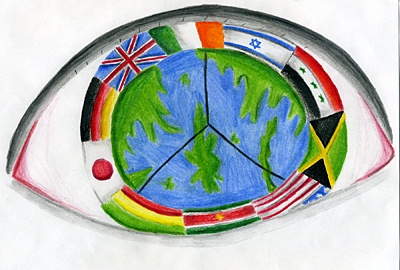All Nonfiction
- Bullying
- Books
- Academic
- Author Interviews
- Celebrity interviews
- College Articles
- College Essays
- Educator of the Year
- Heroes
- Interviews
- Memoir
- Personal Experience
- Sports
- Travel & Culture
All Opinions
- Bullying
- Current Events / Politics
- Discrimination
- Drugs / Alcohol / Smoking
- Entertainment / Celebrities
- Environment
- Love / Relationships
- Movies / Music / TV
- Pop Culture / Trends
- School / College
- Social Issues / Civics
- Spirituality / Religion
- Sports / Hobbies
All Hot Topics
- Bullying
- Community Service
- Environment
- Health
- Letters to the Editor
- Pride & Prejudice
- What Matters
- Back
Summer Guide
- Program Links
- Program Reviews
- Back
College Guide
- College Links
- College Reviews
- College Essays
- College Articles
- Back
What About True Peace?
Peace. What about peace is it that we so covet? Officially, peace is defined as ‘a state or period in which there is no war or a war has ended’ – but does the absence of war truly bring the presence of peace? Or is there more to the picture of tranquility?
It is a common belief that resigning oneself to a situation, or ignoring those around one that one dislikes, is the path to peace. Perhaps it is; after all, avoiding active violence insinuates fewer wars. However, is war the only antonym to peace? The Student Peace Alliance reports that close to 60 percent of boys in grades six to nine classified as bullies were convicted of breaking the law by the time they reached age twenty-four. Meanwhile, the U.S. Centers for Disease Control and Prevention reported that in 2001, one in three high school students had been in a physical altercation during the past year. No – the absence of war between states and nations most certainly does not mean peace.
In actual fact, peace is a multi-layered thing; true peace is dynamic, and resilient. True peace blooms in the home, in the smallest of communities, founded not by mere acceptance or resignation but nurtured with communication and a true zest for unity. True peace is love.
As Jimi Hendrix once said, ‘When the power of love overcomes the love of power, the world will know peace.’ With this in mind, a real peace built upon love becomes possible. To achieve this peace, we must strive to open our hearts to the pleas of the world, to recognize injustice and act to change it, and to fight the temptation of apathy – for when the facade of indifference falls, the results are bitter. The desire for peace must first be implanted as a yearning deep within our hearts.
The United Nations first introduced the observance of the International Day of Peace on the 21st of September, 1982. This day is commemorated, even today, to mark ceasefire – not simply political armistice, but also personal ones. This is a global reminder that true peace must be worked towards gradually; one step at a time. As the world learns to value diversity and adapt to open-mindedness on a larger scale, the road to a dynamic peace will reveal itself, albeit not overnight. If we take the baby steps forward as individual advocates of peace, change will come in time.
Peace might be ignorance. Peace can be defined as suppressed hatred and peace might be apathy. But what about true peace? True peace, in all its simplicity, is love – love for our neighbours and love for unity. No matter who we are, how old we are or what our status in society renders us, we are all needed as instruments of peace in the darkness of discord. In the words of Martin Luther King Jr., ‘Darkness cannot drive out darkness: only light can do that. Hate cannot drive out hate: only love can do that.’

Similar Articles
JOIN THE DISCUSSION
This article has 0 comments.
